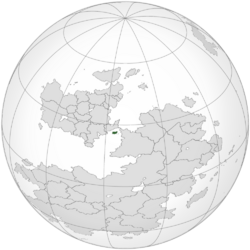Government of National Salvation (Emessa)
State of Emessa Istadu de Imisu (Emessan) | |||||||||
|---|---|---|---|---|---|---|---|---|---|
| 1955–1985 | |||||||||
| Motto: De parícius únu (Emessan) "Out of many, one" | |||||||||
| Anthem: Sa pèrela de su mari sorianu (Emessan) "The Pearl of the Solarian Sea" | |||||||||
 | |||||||||
| Capital and largest city | Lyria | ||||||||
| Common languages | Emessan | ||||||||
| Government | Unitary authoritarian military dictatorship | ||||||||
| History | |||||||||
| 30 October 1955 | |||||||||
| 13 January 1985 | |||||||||
| Area | |||||||||
• Total | 22,487 km2 (8,682 sq mi) | ||||||||
• Water (%) | 3.1 | ||||||||
| Population | |||||||||
• 1955 | 4,659,792 | ||||||||
• 1985 | 5,766,386 | ||||||||
| Currency | Emessan lira | ||||||||
| |||||||||
The Government of National Salvation (Emessan: Cubérru de salvatziòni natzionali, CSN), which was more commonly known as the Triumvirate (Emessan: Triumbiradu), was the military junta that ruled Emessa for a thirty-years period from 1955 to 1985. Headed by the National Salvation Committee, a three-member directorial system of military officers styled Presidents (or informally, triumvirs) representing each of the country's main religious communities: Sotirianity, Irfan, and Atudaism, the Triumvirate formed and collaborated with civilian institutions through the Patriotic Front, a coalition of political parties supporting the dictatorship backing its core programme of Palingenesis, which was aiming to create an united national identity across sectarian lines.
Despite the stated intentions of its founding fathers at the Catherby Conference, the Emessan republic had devolved to religious infighting by 1953 — only three years after independence. Increasing polarisation led to minor clashes that the central government was incapable of preventing, and threatened to evolve into an all-out conflict after the Lyria riots. The imminent threat of a civil war prompted the Emessan military to intervene and seize power on 30 October 1955 and dismissing the civilian government, ostensibly on the behalf of "the people of Emessa", then immediately started consolidating its position by forming alliances with the various religious moderate groups, the nationalist Popular Party, and the socialist Emessan Section of the Workers’ International.
Initially considered a possibly radical and revolutionary régime, the Government of National Salvation moved closer towards economically liberal and social conservative lines following the purge of the Popular Party in the aftermath of their failed attempt of forcing the handover of the then-Estmerish Cape Mercantis in 1965, and the final breaking down of relations with the ESWI on the matter of the growing left-wing terrorism in 1968. Despite economic reforms and record growth in the 1970s, and a victory against Tsabara in the Alban War in 1982, the democracy movement grew increasingly prevalent. The ailing Triumvirate called a referendum in 1984 to reaffirm their popular mandate, but were unexpectedly defeated and accepted the results, leading to the restoration of democratic institution complete by 13 January 1985.
The legacy of the Government of National Salvation remains controversial today: its role in preventing civil war in 1955 is its only action universally recognised as a success. Its supporters point out to the stability the dictatorship brought, the success of the Palingenesis policy in creating an Emessan national identity out of the historically divided country, and the economic growth it brought. Opponents highlights the political repression and the numerous human rights abuses of the régime, and notably to the long-lasting social consequences of those. The absence of justice for the victims of the régime, and the influence of former CSN members and collaborators in the economic and mediatic sectors remains two major point of contention in the reconciliation process.

